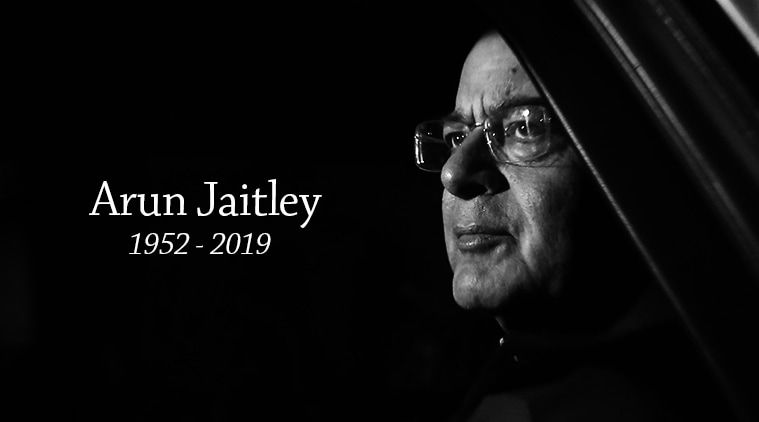
IN my last interaction with Arun Jaitley less than a month ago, he made a stray comment which could well serve as his epitaph. He said he made it a point to help whenever he was in a position to do so and he had been amply rewarded by the goodwill he enjoyed — he was speaking in the context of an opposition leader who found himself friendless in his recent legal difficulties.
Jaitley, 66, was a man who touched the lives of most with whom he interacted. At the All India Institute of Medical Sciences, as news of his death spread, people from all walks of life — from ministers and tycoons to party workers, lawyers to family friends — wept openly as they crowded the corridors of the hospital to pay their last respects, with security at a minimum. The moist eyes and ashen faces in the spheres in which he once held sway — the courts, Parliament, the cricket fraternity, the media, the Lodhi Gardens, the world of commerce, the corridors of power, BJP offices — reflect the universal affection in which he was held. A lawyer who has fought many legal battles against Jaitley’s government told me at the hospital today, “He was the last good man in politics.’’ LIVE | Farewell, Arun Jaitley
He was one of the most generous men I knew, ever ready to extend a helping hand. Many of the people he mentored are today in key positions in government, several ministers in Modi’s cabinet are his protégés. His former juniors in the law practice have risen high in the profession. He was proud that the children of his office staff had performed extremely well in their respective professions, thanks to his generosity and encouragement.
READ | Guide to young lawyers, Arun Jaitley had ‘uncanny ability to simplify legal arguments’
Jaitley was among the first to appreciate the talent of Narendra Modi when he was a faceless party general secretary in Delhi in the 1990s. In 2010, when Amit Shah was briefly externed from Gujarat, one often found Shah sitting in a corner of Jaitley’s office in Parliament. Till almost the very end, Jaitley remained in regular touch with the Prime Minister and the Home Minister, even though he had refused to accept any ministerial post in the new government because of his failing health.
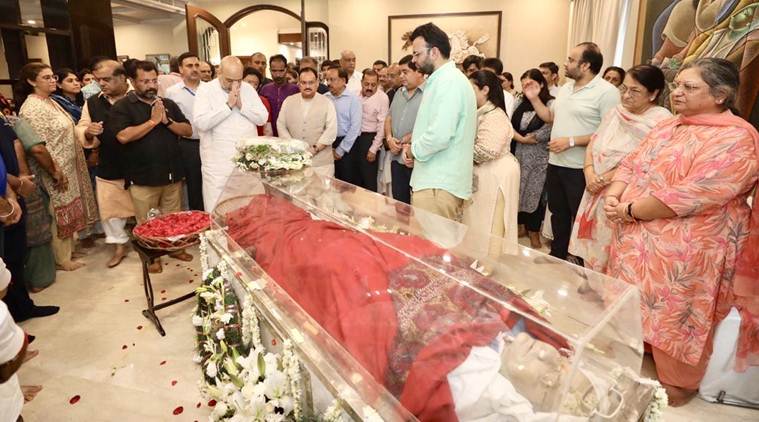
He may have been a member of a party that’s considered by its detractors as closed-minded, but he himself remained a liberal humanist, always ready to listen to views which differed from his own. Once when I commented that he was looking very grim in a newspaper photograph in which he had an elaborate saffron headgear, he admitted candidly that he felt uncomfortable with such trappings. When others in his party were bending over backwards to prove their party loyalty during the controversial 2017 vote for a Rajya Sabha seat from Gujarat — Ahmed Patel was the Congress candidate and the BJP resorted to some arm twisting — he was asked by a journalist in Parliament on which side was he on. He replied simply, “I am for democracy.’’ His enlightened, flexible touch, which often softened his party’s rigid and dogmatic approach, will be much missed in the government.
ALSO READ | Firefighter goes down fighting
He had many close friends across the political divide. Pranab Mukherjee, as the UPA’s finance minister, confessed at an Idea Exchange programme of The Indian Express that the man he most admired from the Opposition ranks was Jaitley, then Leader of the Opposition in Rajya Sabha. As a student leader during JP’s agitation, he became close to fellow students from Bihar, Lalu Prasad Yadav and Nitish Kumar, who were his contemporaries in the movement. Congress leaders such as Jyotiraditya Scindia and Rajiv Shukla were family friends.
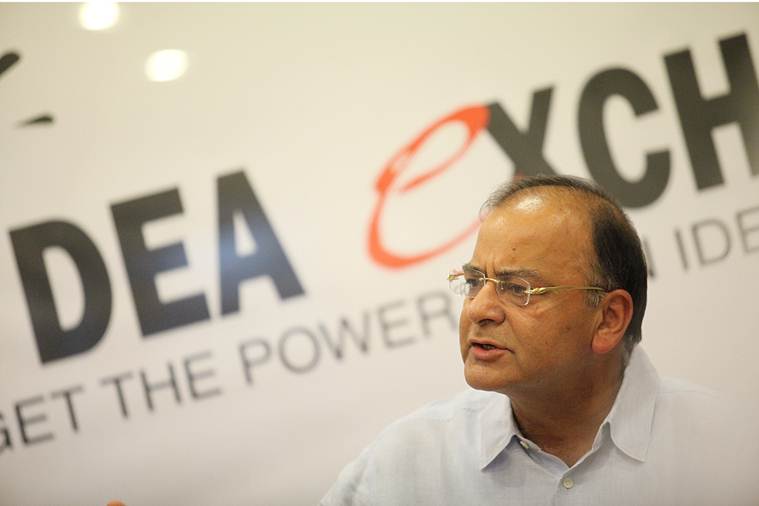
Amarinder Singh may have defeated him in the Amritsar Lok Sabha constituency in 2014, but the two remained in touch. He had a long association with the Badals of the Akali Dal. His numerous contacts benefited his party in stitching up alliances, reaching political agreements and fire-fighting. For instance, at a farewell dinner for Pranab Mukherjee as President in 2017, Jaitley tipped off Nitish Kumar that Lalu Prasad was planning to break his party. In the bargain, Jaitley sewed up an alliance between the JD(U) and BJP in Bihar.
He was always a favourite of the media. Parliament correspondents would wait eagerly for him to make an appearance in Central Hall in the afternoons, since he invariably had some juicy tidbit to relate or a humorous anecdote which had not escaped his eagle eye. He was a brilliant raconteur who was the centre of attraction in many a gathering, whether in Lodhi Gardens after a walk or at a dinner party. He had intimate knowledge of men and matters, partly because people tended to confide in him and partly because of his prodigious memory. The term “Khan Market set’’ was first coined by him, as were many other such witticisms. Such was the goodwill he enjoyed in the legal fraternity that when he campaigned for the Amritsar seat in 2014, scores of Delhi’s top lawyers took time off from their high-paying billable hours to stomp the streets of the city for him.
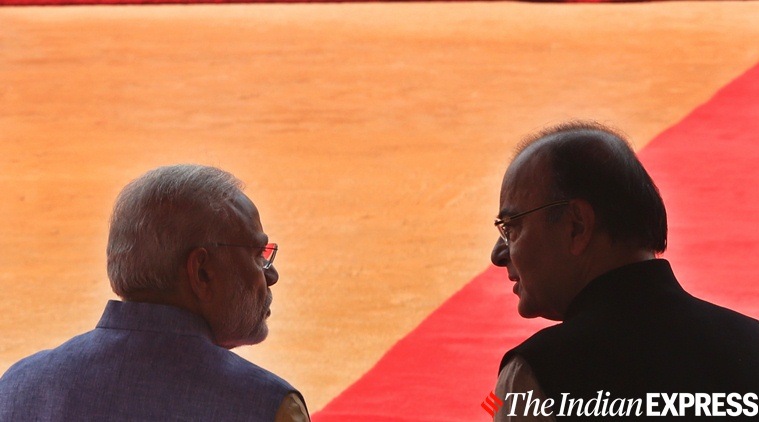
During Modi’s first government in 2014, Jaitley was the PM’s trusted point person with the Opposition and the media. He was also a sounding board for many government appointments since Modi was new to the Capital’s corridors of power. It was indicative of the faith Modi reposed in Jaitley, as perhaps also evidence of a lack of experience in the Cabinet, that in the initial months, Jaitley was put in charge of the heavy portfolios of Finance, Commerce and Defence and also asked to look after the Information and Broadcasting ministry temporarily.
My first introduction to Jaitley was back in 1974 during Indira Gandhi’s regime when I was a cub reporter and covered the victory of the handsome, articulate student leader from the ABVP, who had defeated the NSUI candidate, *Brij Mohan Bhama, in the Delhi University Students Union election. In those days, Congress organisations dominated every sphere, so the victory was a major breakthrough. And unlike many student-politicians, his academic record at the prestigious Shri Ram College of Commerce was equally impressive. As a student leader, Jaitley played an active role in the JP movement. When Emergency was declared on June 26, 1975, there was a warrant out for his arrest. He escaped police by jumping over the rear wall of his house. Nevertheless by midday, he organised a student rally in Delhi University against Indira Gandhi. He spent the next 19 months in jail, but never let imprisonment bring his spirits down. As he once observed to me, “You could create your own world inside the prison. If you were young and thinking of fighting the Emergency, you did not get demoralised.’’ In jail, he continued with his legal studies, got a first class in his second-year law, and made friends with people from various Opposition parties. He also met my husband Virendra Kapoor, a fellow MISA detenu, and they remained lifelong friends.
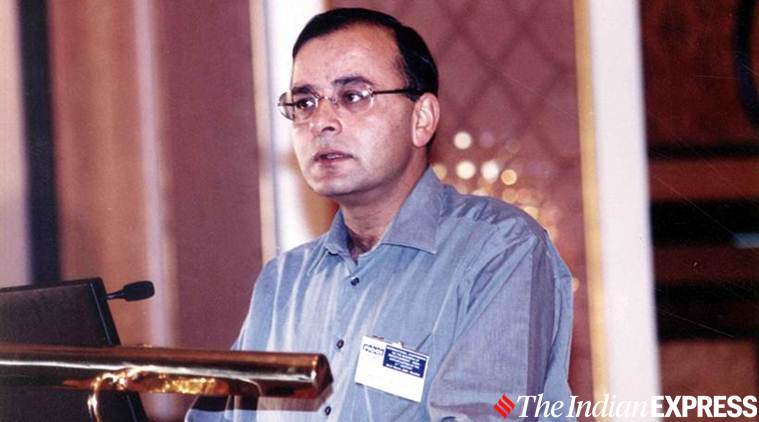
After the election of the Janata government in 1977, Jaitley completed his law degree and established himself as a promising lawyer. The Indian Express founder Ramnath Goenka, struck by his acumen, appointed him as the newspaper’s legal adviser. By 1980, the newspaper was fighting the Indira Gandhi government on several fronts. Jaitley was in and out of the Express building, a part of which the government even threatened to demolish. He carefully vetted the newspaper’s major campaigns against the powers that be to ensure that nothing was libellous. He always retained a special affection for the newspaper, even when he did not always agree with its views.
It was V P Singh who, as Prime Minister, gave Jaitley his first big break in the profession by appointing him Additional Solicitor General in 1989 at the young age of 36. Jaitley played an active role in the Bofors investigations. When Atal Bihari Vajpayee was sworn in as Prime Minister in 1999, Jaitley did not always get the positions he might have aspired for — he was seen initially as L K Advani’s man and Pramod Mahajan, who had the blessings of the RSS, viewed him as competition. But when given responsibility as a Minister of State in portfolios such as Law, Information and Broadcasting, and Corporate Affairs, he proved his mettle. When his party was out of office, Jaitley, apart from being the party general secretary and one of the chief spokespersons, also pursued his legal practice. He was regarded as one of the country’s leading senior counsel. One of his juniors recalls with awe his elephantine memory and his ability to grasp the crux of a case in a few minutes of reading a brief.
In 2009, his party appointed him Leader of the Opposition in Rajya Sabha and he had to give up his legal practice, which meant a considerable financial sacrifice. Though he did have a weakness for collecting expensive pens, watches and shawls, his culinary tastes were simple with Amritsari fish and bhatura being his favoured menu. There was never a hint of corruption throughout his career. Arvind Kejriwal once alleged that there were malpractices when Jaitley headed the Delhi District Cricket Association for 13 years. Facing a defamation case, the Delhi CM sheepishly apologised.
When Modi was sworn in as Prime Minister in 2014, it was but natural that Jaitley would become a key figure in his government since he was one of the few party seniors who backed Modi all the way from the beginning. As Finance Minister, he was responsible for ushering in GST, considered the most important economic reform since liberalisation. With his legal background and friendly relationships with leaders across parties, he played a significant role in fine-tuning important legislation in both the UPA and NDA governments for a decade, including the Anti Defection and Triple Talaq Bills.
Jaitley was dogged by ill health soon after he took oath in 2014. He fought his health issues with fortitude and courage and never let the world know of the many medical setbacks he faced. Almost till the end, he never gave up hope and continued to fight the infections. His death leaves a vacuum in current politics which will be difficult to fill.
*An earlier version said Jaitley defeated Pankaj Vohra in 1973 elections. The error has been rectified.